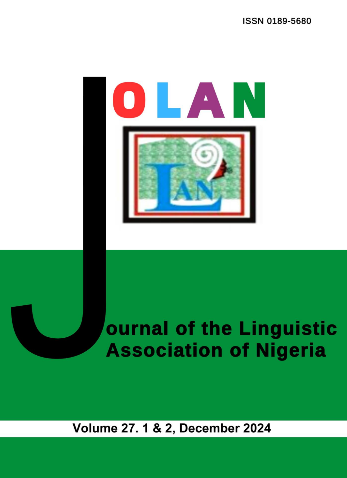Children and Language Choice: A Case Study of Abraka Speech Community
Keywords:
Language choice, plurilingualism, Abraka, ChildrenAbstract
In plurilinguistic societies, there are linguistic alternatives which are constantly available to speakers. Thus in communicative situations, speakers must decide, in the first place, the language(s) within which the communication is to be executed. However, such choice is driven by certain factors. In the present study, attempt is made to examine the typical language attitude of bi-/multi-lingual children in Abraka speech community. The goal is to investigate patterns of choice of language made in different domains by bi-/multilingual children residing in a multilingual society. The research work draws evidence from data elicited from 25 pupils from schools in Abraka town. The pupils were randomly selected, and information was elicited from them through structured interview and participant observation. The data are analyzed using descriptive frequency within the issue-focused framework.
References
Coulmas, F. 1997. A matter of choice. In M. Pütz (ed.). Language choices: Conditions, constraints
and consequences. Amsterdam: John Benjamins.
Dada, S. A. 2006. Code-switching and code-mixing in Erushu community. PhD Dissertation,
University of Ibadan.
Decker, K. and J. Grummit. 2012. Understanding language choices: A guide to sociolinguistic
assessment. Dallas: SIL.
Duan, L. 2004. A sociolinguistic study of language use and language attitudes among the Bai
people in China. MA Thesis, Payap University, Thailand.
Fishman, J. A. 1991. Reversing language shift: Theoretical and empirical foundations of assistance
to threatened languages. Clevedon: Multilingual Matters.
Muysken, P. 2000. Bilingual speech: A typology of code-mixing. Cambridge: Cambridge
University Press.
Onomajuru, V. C. 2017. Code-mixing among Igbo preachers. Journal of West African Languages,
(2): 14-22.
Reyhner, J. 1991. Some basics of indigenous language revitalization. In J. Reyhner, G. Cantoni, R.
N. St. Clair and E. P. Yazzie (eds.). Revitalizing Indigenous Languages. Arizona: Arizona
University Press.
Tucker, G. R. 1999.A global perspective on bilingualism and bilingual education. Carnegie: Mellon
University.














